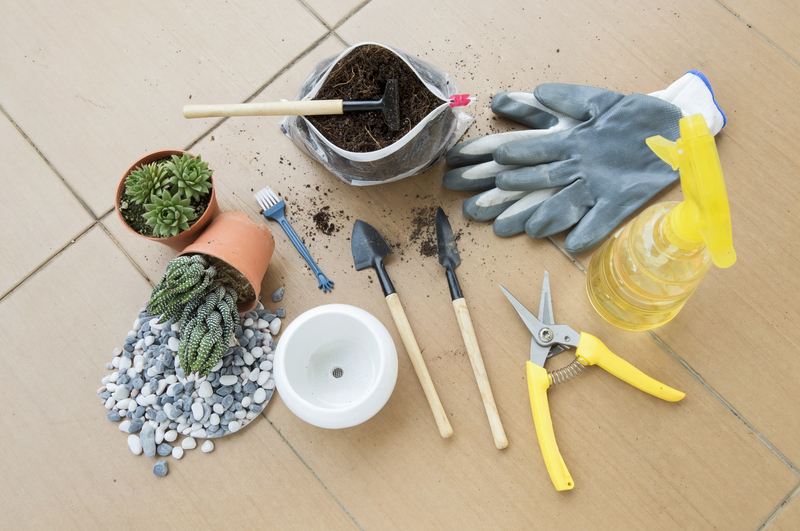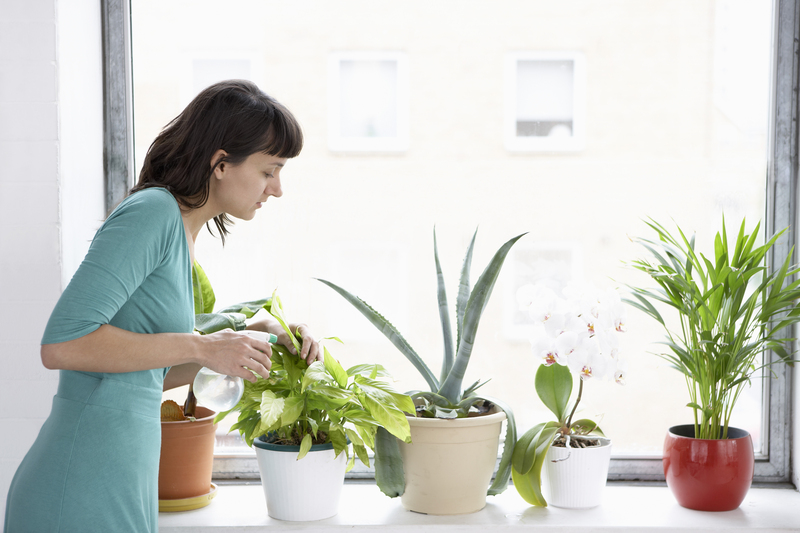Pet-Protective Gardening Tips for Enthusiasts
Posted on 18/08/2025
Pet-Protective Gardening Tips for Enthusiasts: Creating a Safe Outdoor Sanctuary
Bringing together a passion for gardening and the love for furry companions can be deeply fulfilling. However, cultivating a beautiful landscape that's also a safe haven for pets requires thoughtful planning and execution. Pet-protective gardening involves making informed choices about plants, landscaping features, and chemical use, ensuring that your outdoor space promotes the well-being of every member of your family -- including the four-legged ones.

Why Pet-Protective Gardening Matters
As a responsible pet owner and avid gardener, you likely want an environment where blooming flowers, lush greenery, and playful pets coexist harmoniously. Unfortunately, numerous common garden plants and products can be harmful to cats, dogs, and other animals. Adopting pet-friendly gardening practices can help prevent accidental poisonings, injuries, and stress for both pets and their humans.
- Pets often chew on leaves, dig in soil, or sniff around unfamiliar objects. Without precautions, this natural curiosity can lead to health hazards.
- Gardening chemicals and pesticides are another significant risk, potentially leaving toxic residues that linger long after use.
- Sharp tools, fences, or mulches may pose physical risks to energetic animals.
Choosing Pet-Safe Plants: Avoiding Toxic Varieties
Not all greenery is created equal when it comes to pets. Numerous popular garden plants are toxic if ingested, touching off symptoms that range from mild stomach upset to life-threatening reactions.
Top Toxic Garden Plants to Avoid
- Lilies -- Extremely dangerous, especially for cats; even tiny amounts can cause acute kidney failure.
- Oleander -- Highly toxic to both cats and dogs, ingesting a single leaf can be fatal.
- Sago Palm -- All parts contain toxins; ingestion leads to severe liver damage.
- Foxglove -- Contains digitalis, a compound that disrupts heart function.
- Azalea & Rhododendron -- Can cause vomiting, diarrhea, and worse if eaten.
Safe, Pet-Friendly Plant Options for Your Garden
- Sunflowers -- Bright and cheerful, they pose no risk to pets.
- Marigolds -- Safe and doubly useful for pest control.
- Basil, Rosemary, and Thyme -- Most common culinary herbs are safe for pets and pleasing to gardeners.
- Spider Plant -- Thrives both indoors and outdoors and is non-toxic.
- Camellia -- Gorgeous blooms without pet hazards.
Tip: Refer to the ASPCA's comprehensive lists of toxic and non-toxic plants before choosing new additions for your yard or garden beds.
Landscape Design Strategies for Pet-Protected Gardens
Thoughtful landscaping is a cornerstone of pet-protective gardening. Not only does it keep your plants safe from rambunctious animals, but it also helps your pets steer clear of danger.
Designing Pet Paths and Play Zones
- Create dedicated play areas using soft, durable ground covers like clover, creeping thyme, or artificial turf.
- Pet paths allow your animals to navigate the garden without damaging fragile flowers or vegetables.
- Mulch wisely: Opt for pet-safe mulching materials such as pine needles, cedar chips, or straw — but never use cocoa mulch, as it contains theobromine, which is toxic to dogs.
Barriers and Enclosures for Safety
- Install low fencing around garden beds to deter digging and trampling.
- Raised garden beds keep edible and decorative plants out of curious paws' reach.
- Consider gated pet runs if your pet is especially adventurous.
Water Features and Their Hazards
- Secure ponds and fountains with fencing or mesh to prevent accidental falls or drinking of treated water.
- Avoid fertilizers and algaecides in water features accessible to animals.
- Always supervise pets around deeper water outdoors.
Pet-Protective Gardening: Chemical Safety and Alternatives
Traditional gardening solutions--fertilizers, pesticides, and herbicides--carry risks for animal health. Even brief exposure can lead to serious illness. Here's how to cultivate a thriving, chemical-free landscape:
Opt for Organic and Natural Products
- Compost supplies rich nutrients for garden beds without the risks of synthetic fertilizers.
- Neem oil and insecticidal soaps are safer alternatives for dealing with pests.
- Diatomaceous earth will deter crawling insects but is harmless to mammals.
Safe Weed Control Methods
- Hand-pulling weeds is labor-intensive but entirely safe for pets.
- Boiling water and vinegar sprays (applied with caution) can kill weeds without leaving harmful residues.
- Dense ground covers crowd out invasive plants, reducing the need for chemical intervention.
Creating a Stimulating and Safe Pet Environment
Planting for Shade and Comfort
- Tall shrubs and trees provide essential shade during hot months, protecting pets from overheating.
- Pet-friendly ground covers offer cool, soft surfaces for lounging.
Incorporate Sensory Elements
- Textures: Vary plants and materials so pets can explore safely with all senses.
- Scents: Use herbs like lavender or mint in areas where you'd like your pet to relax. (Avoid strong aromatics if pets have respiratory sensitivities.)
- Water: Provide a shallow water bowl or pet fountain for hydration and play.
Addressing Digging, Chewing, and Other Garden Mischief
Keep pets from turning your garden into their personal playground (at least in the places you don't want them to!).
- Designate a digging area with loose soil and toys to channel the urge productively.
- Install chicken wire or rocks just under the soil surface in vulnerable vegetable or flower beds to deter digging.
- Keep enticing but harmful items (sticks, nuts, berries) out of reach and remove fallen fruit promptly.
- Use natural deterrents such as citrus peels or pet-safe sprays to keep animals away from critical spots.
Garden Storage and Maintenance: Secure Tools and Supplies
Tool Safety for Pets
- Store sharp tools (pruners, shears, hoes) out of reach in locked sheds or cabinets.
- Keep fertilizers and soil amendments in their original packaging, sealed and away from curious noses.
- Clean up garden debris regularly to prevent hidden dangers like moldy mulch or splinters.
Pet-Protective Gardening Tips for Special Circumstances
Gardening with Puppies and Kittens
- Supervise young animals closely as they learn garden boundaries.
- Use temporary fencing to block access to sensitive or newly planted areas.
- Introduce new plants gradually to minimize chewing and trampling.
Accommodating Senior or Special-Needs Pets
- Level walking surfaces to prevent trips and falls.
- Ensure easy access to shade and water at all times.
- Set up ramps or gentle slopes if pets have mobility challenges.
Common Questions About Pet-Protective Gardening
Are All Mulches Safe for Pets?
No, not all mulches are pet-friendly. Cocoa mulch, for instance, is toxic to dogs. Stick to pine, cedar, or untreated wood chips.What If My Pet Eats a Garden Plant?
If you suspect your pet has ingested a potentially toxic plant, contact your veterinarian immediately or call the ASPCA Animal Poison Control Center. Bring a sample of the ingested material with you for proper identification.Are Chemical-Free Gardens Really Pest-Free?
While organic practices can mitigate many pest problems, no garden is completely pest-proof. Combine natural deterrents with healthy garden maintenance for the best results.
Benefits of Pet-Protective Gardening: More Than Just Safety
- Peace of mind: Know your pet can play freely without constant supervision or anxiety.
- Healthier Environment: Fresher air, less chemical exposure, and fewer allergies for all.
- Stronger Bond: Share the outdoors together, building joyful memories in a shared sanctuary.
Summary: Pet-Safe Gardening for Nature and Nurture
By embracing pet-protective gardening tips, you ensure that your outdoor spaces support the safety, happiness, and well-being of your cherished pets. With mindful plant selection, thoughtful landscaping, and safe gardening supplies, you'll cultivate not just a vibrant landscape but a true family haven. Whether you're a gardening novice or a seasoned enthusiast, these strategies empower you to nurture both your plants and your pets, season after season.
Start Your Pet-Friendly Gardening Journey Today!
Take stock of your yard, update your plant list, secure your tools, and implement these pet-protective gardening measures. Your pets--and your plants--will thank you for it!
Latest Posts
Design a Simple Garden That Saves Time and Money
Sprouting Creativity: Designing Gardens for Young Minds
Crafting Living Works of Art with Hedge Trimming

